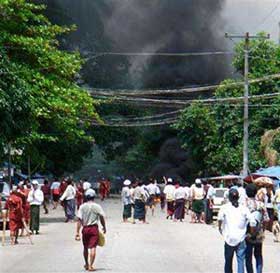
|
|
|
Home Asia Pacific South East Asia Myanmar Myanmar Protest News If I shot monks I'd go to Hell, says major who fledby Nick Meo, The Times, October 3, 2007Rangoon, Burma -- As demonstrations mounted in Rangoon and the military prepared for a crackdown, an agonising decision loomed for Major Htay Win. The soldier, who has fought ethnic rebels for 21 years, knew that he would be executed if he refused to shoot demonstrators. But as a devout Buddhist he was convinced he would burn in Hell if he killed the monks.
Major Htay, 43, one of the first Burmese officers to flee since the crackdown, now faces an uncertain future. Although he is seeking sanctuary in Norway, he fears that the Thai authorities will send him back to a firing squad or that he will fall victim to vengeful Burmese assassins. Speaking through his 17-year-old son at a safe house in the border town of Mae Sot, Major Htay said yesterday that he decided to desert a week ago because he knew an order to shoot monks was imminent. “I am a Buddhist as well as a soldier. I could see what was going to happen when the demonstrations started growing.
The account Major Htay gave The Times was of an angry and divided army, horrified at being forced to crush protesters they broadly sympathised with, but also fearful of the hard-core of officers loyal to Than Shwe, Burma’s military leader. He was with the 99 Division in Rangoon when the protests started. He could not confirm reports that hundreds of monks had been buried in the jungle. He deserted before the killings started and said that his only knowledge of casualties was from dissident radio reports. “I am just the first who will come to Thailand,” he said. “There are many officers like me who are deeply unhappy. They didn’t want to kill the monks. Many officers are also angry because the Burmese people are hungry.” He claimed that many sympathise with Aung San Suu Kyi, Burma’s jailed pro-democracy leader. “The problem is that they are afraid of Than Shwe. He is so cruel,” he said. “I am sure officers must have refused their orders to shoot monks. They will themselves be shot — it will happen in a prison and we will never hear about it. If I went back to Burma, I would be executed by them without a moment’s thought.” Even in Thailand the risk to his life remains real. In the last year about five exiled Burmese dissidents among Mae Sot’s expatriate community have been kidnapped, by bounty hunters it is believed, and returned to an uncertain fate inside Burma. Although aware that his actions may have put his family in danger, Major Htay said that he had no choice but to flee. He refused to allow his face to be pictured to make it harder for assassins to identify him. Of the officers who were loyal to the junta, he said: “There are two reasons for loyalty; they become rich from business, and they are afraid of being killed for disobedience. But in their hearts many of them loathe Than Shwe’s cruelty and they are with the people. I haven’t heard of soldiers mutinying, but it could happen. “Than Shwe will try to hang on to power, but I believe this time next year he will be gone. There are other soldiers who want his power.” None of his colleagues believed the regime’s claim that protesters were in league with foreign powers. “They know that is bulls**t. The generals just want to cling on to power,” he said. After escaping from Rangoon, Major Htay made contact with Colonel Nerdah Mya, of the Karen National Liberation Army, and Dr Hans Schilde, a Norwegian activist. Colonel Nerdah said that his men were preparing to welcome other defectors in the mountainous jungles along the border with Thailand. Burma’s Army, according to several accounts, is increasingly disgruntled and has high desertion rates, especially among lower ranks, who are often recruited from petty criminals, orphans and the destitute. Khun Saing, a dissident in Mae Sot, got to know jailed soldiers during his 13 years in the regime’s prisons. He said: “Many of them had been forced to shoot their friends, especially for desertion. The Army is run by fear.” Many of the loyal officers are graduates of the old British hill station of Maymyo, Burma’s Sandhurst, where high-fliers are sent. They are always from the majority Burman ethnic group and sons of officers. |
 Get your Korean Buddhist News here, brought to you by BTN-Buddhist Channel |
 |
 The Mandala app brings together Buddhist wisdom and meditation techniques with the latest insights of psychology and neuroscience to handle the challenges and complexities of modern life. The App offers a series of engaging talks and conversations with experts on a wide variety of topics, such as managing stress, dealing with adversity, developing greater resilience, cultivating empathy and compassion, creating healthy relationships, and many more. These topics are explored to help find greater peace, meaning and joy in our lives. Our panel of experts include Dr, Thupten Jinpa, Daniel Goleman, Kelly McGonigal and others.FREE DOWNLOAD here |
| Point
your feed reader to this location |
| Submit an Article |
| Write to the Editor |

 Faced with an impossible choice he deserted, fleeing through the jungle to join his old enemies, the Karen guerrillas, who smuggled him into Thailand.
Faced with an impossible choice he deserted, fleeing through the jungle to join his old enemies, the Karen guerrillas, who smuggled him into Thailand.